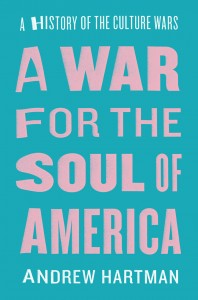Welcome to DU!
The truly grassroots left-of-center political community where regular people, not algorithms, drive the discussions and set the standards.
Join the community:
Create a free account
Support DU (and get rid of ads!):
Become a Star Member
Latest Breaking News
General Discussion
The DU Lounge
All Forums
Issue Forums
Culture Forums
Alliance Forums
Region Forums
Support Forums
Help & Search
The Culture Wars Are Dead, Long Live the Culture Wars!
Are we really living in a post-culture warrior society? Or have we just moved the front line in the war against culture? Intellectual historian Andrew Hartman argues that it's just more of the same, but different.

Again, this is true so far as it goes, but the notion that the culture wars are more about national identity now than in the 80s and 90s is plain wrong. The culture wars of the 80s and 90s were over nothing if not over what it means to be an American. Dionne’s problem, in part, is that he is too reliant upon Hunter, who focused too much on religion in his explanation of the culture wars. Religion was crucial, of course. But religion gets overstated, as I make clear in my book, where I argue that secular neoconservatives play an even larger role than the Christian Right in setting the parameters of the culture wars. It was the neoconservatives who taught the rest of conservative America how to fear and loathe the sixties.
Moreover, for many religious conservatives, particularly white evangelicals, religion expressed a larger national identity. Christianity was crucial to a normative framework of Americanism. One of the primary aspirations of the Christian Right was to re-establish, in the words of philosopher Charles Taylor, an “understanding that used to define the nation, where being American would once more have a connection with theism, with being ‘one nation under God,’ or at least with the ethic which was interwoven with this.”
...
Neoconservatives argued that the cultural radicalism of the sixties made for both bad culture and bad economics. The movements of the sixties, in their eyes, were both hostile to traditional American values and dangerously anticapitalist. In this, like Dionne but from a different vantage point, neoconservatives tapped into a powerful American political language that separated those who earn their way from those who do not. During the Populist uprisings of the late nineteenth century, or during the great union drives of the 1930s, a rapacious corporate elite was assigned the role of leeches. Neoconservatives, in reverse, argued that sixties movements enabled a parasitic culture.
More: http://s-usih.org/2015/01/the-culture-wars-are-dead-long-live-the-culture-wars.html
Jonathan Dresner's comment there was quite insightful too I thought:
I would argue that the Culture wars never ended, but the battlefield shifted: rather than a debate about a common culture, which was the first wave, the current conflict is about secessionist spaces where cultures can be enacted without interacting with competing visions. Private schools, homeschooling, politically dedicated media outlets, conservapedia….
InfoView thread info, including edit history
TrashPut this thread in your Trash Can (My DU » Trash Can)
BookmarkAdd this thread to your Bookmarks (My DU » Bookmarks)
1 replies, 875 views
ShareGet links to this post and/or share on social media
AlertAlert this post for a rule violation
PowersThere are no powers you can use on this post
EditCannot edit other people's posts
ReplyReply to this post
EditCannot edit other people's posts
Rec (2)
ReplyReply to this post
1 replies
 = new reply since forum marked as read
Highlight:
NoneDon't highlight anything
5 newestHighlight 5 most recent replies
= new reply since forum marked as read
Highlight:
NoneDon't highlight anything
5 newestHighlight 5 most recent replies
The Culture Wars Are Dead, Long Live the Culture Wars! (Original Post)
unrepentant progress
Jan 2015
OP
MisterP
(23,730 posts)1. there are definitely scientific homologues for Lynne Cheney: but they're very good at rewriting
their own history--today some of them say you can't trust corporate studies, while back in 1992 they would've been the ones saying that if you said not to trust corporate studies you were a postmodernist or, worse, a feminist
they're very Orwellian